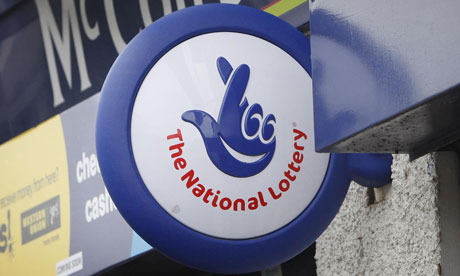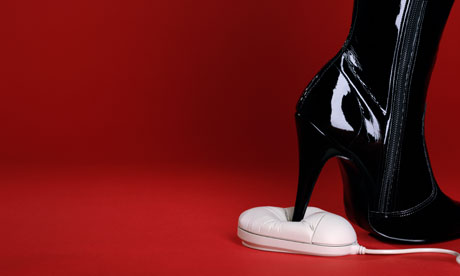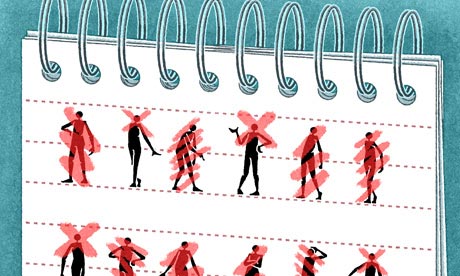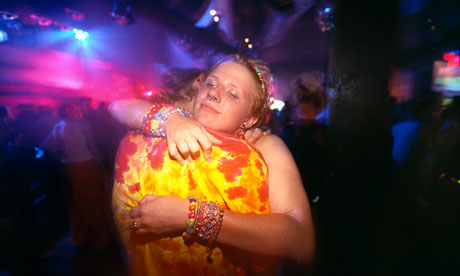Julian Assange has been holed up in the Ecuadorian embassy for six months. In a rare interview, we ask the WikiLeaks founder about reports of illness, paranoia – and if he'll ever come out
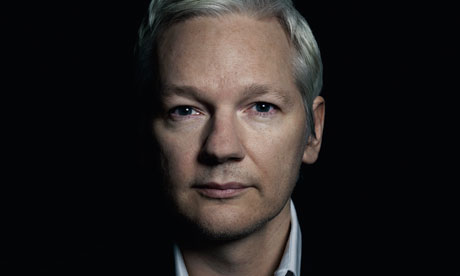
Julian Assange: 'I suppose it’s quite nice that people are worried about me.’ Photograph: Gian Paul Lozza for the Guardian
The Ecuadorian embassy in Knightsbridge looks rather lavish from the street, but inside it's not much bigger than a family apartment. The armed police guard outside is reported to cost £12,000 a day, but I can see only three officers, all of whom look supremely bored. Christmas shoppers heading for Harrods next door bustle by, indifferent or oblivious to the fact that they pass within feet of one of the world's most famous fugitives.
It's almost six months since Julian Assange took refuge in the embassy, and a state of affairs that was at first sensational is slowly becoming surreal. Ecuador has granted its guest formal asylum, but the WikiLeaks founder can't get as far as Harrods, let alone to South America, because the moment he leaves the embassy, he will be arrested – even if he comes out in a diplomatic bag or handcuffed to the ambassador – and extradited toSweden to face allegations of rape and sexual assault. Assange says he'll happily go to Stockholm, providing the Swedish government guarantees he won't then be extradited on to the US, where he fears he will be tried for espionage. Stockholm says no guarantee can be given, because that decision would lie with the courts. And so the weeks have stretched into months, and may yet stretch on into years.
Making the whole arrangement even stranger are the elements of normality. A receptionist buzzes me in and checks my ID, and then a businesslike young woman, Assange's assistant, leads me through into a standard-issue meeting room, where a young man who has something to do with publicity at Assange's publishers is sitting in front of a laptop. There are pieces of camera equipment and a tripod; someone suggests coffee. It all looks and feels like an ordinary interview.
But when Assange appears, he seems more like an in-patient than an interviewee, his opening words slow and hesitant, the voice so cracked as to be barely audible. If you have ever visited someone convalescing after a breakdown, his demeanour would be instantly recognisable. Admirers cast him as the new Jason Bourne, but in these first few minutes I worry he may be heading more towards Miss Havisham.
Assange tells me he sees visitors most days, but I'm not sure how long it was since a stranger was here, so I ask if this feels uncomfortable. "No, I look forward to the company. And, in some cases, the adversary." His gaze flickers coolly. "We'll see which." He shrugs off recent press reports of a chronic lung infection, but says: "I suppose it's quite nice, though, actually, that people are worried about me." Former hostages often talk about what it meant to hear their name on the radio and know the outside world was still thinking of them. Have the reports of his health held something similar for him? "Absolutely. Though I felt that much more keenly when I was in prison."
Assange spent 10 days in jail in December 2010, before being bailed to the stately home of a supporter in Suffolk. There, he was free to come and go in daylight hours, yet he says he felt more in captivity then than he does now. "During the period of house arrest, I had an electronic manacle around my leg for 24 hours a day, and for someone who has tried to give others liberty all their adult life, that is absolutely intolerable. And I had to go to the police at a specific time every day – every day – Christmas Day, New Year's Day – for over 550 days in a row." His voice is warming now, barbed with indignation. "One minute late would mean being placed into prison immediately." Despite being even more confined here, he's now the author of his own confinement, so he feels freer?
"Precisely."
And now he is the author of a new book, Cypherpunks: Freedom And The Future Of TheInternet. Based on conversations and interviews with three other cypherpunks – internet activists fighting for online privacy – it warns that we are sleepwalking towards a "new transnational dystopia". Its tone is portentous – "The internet, our greatest tool of emancipation, has been transformed into the most dangerous facilitator of totalitarianism we have ever seen" – and its target audience anyone who has ever gone online or used a mobile phone.
"The last 10 years have seen a revolution in interception technology, where we have gone from tactical interception to strategic interception," he explains. "Tactical interception is the one that we are all familiar with, where particular individuals become of interest to the state or its friends: activists, drug dealers, and so on. Their phones are intercepted, their email communication is intercepted, their friends are intercepted, and so on. We've gone from that situation to strategic interception, where everything flowing out of or into a country – and for some countries domestically as well – is intercepted and stored permanently. Permanently. It's more efficient to take and store everything than it is to work out who you want to intercept."
The change is partly down to economies of scale: interception costs have been halving every two years, whereas the human population has been doubling only every 20. "So we've now reached this critical juncture where it is possible to intercept everyone – every SMS, every email, every mobile phone call – and store it and search it for a nominal fee by governmental standards. A kit produced in South Africa can store and index all telecommunications traffic in and out of a medium-sized nation for $10m a year." And the public has no idea, due largely to a powerful lobby dedicated to keeping it in the dark, and partly to the legal and technological complexity. So we spend our days actively assisting the state's theft of private information about us, by putting it all online.
"The penetration of the Stasi in East Germany is reported to be up to 10% of the population – one in 10 at some stage acted as informers – but the penetration of Facebook in countries like Iceland is 88%, and those people are informing much more frequently and in much more detail than they ever were in the Stasi. And they're not even getting paid to do it! They're doing it because they feel they'll be excluded from social opportunities otherwise. So we're now in this unique position where we have all the ingredients for a turnkey totalitarian state."
In this dystopian future, Assange sees only one way to protect ourselves: cryptography. Just as handwashing was once a novelty that became part of everyday life, and crucial to protecting our health, so, too, will we have to get used to encrypting our online activity. "A well-defined mathematical algorithm can encrypt something quickly, but to decrypt it would take billions of years – or trillions of dollars' worth of electricity to drive the computer. So cryptography is the essential building block of independence for organisations on the internet, just like armies are the essential building blocks of states, because otherwise one state just takes over another. There is no other way for our intellectual life to gain proper independence from the security guards of the world, the people who control physical reality."
Assange talks in the manner of a man who has worked out that the Earth is round, while everyone else is lumbering on under the impression that it is flat. It makes you sit up and listen, but raises two doubts about how to judge his thesis. There's no debate that Assange knows more about the subject than almost anyone alive, and the case he makes is both compelling and scary. But there's a question mark over his own credentials as a crusader against abuses of power, and another over his frame of mind. After all the dramas of the last two and a half years, it's hard to read his book without wondering, is Assange a hypocrite – and is he a reliable witness?
 Assange in the Ecuadorian embassy: ‘It would be nice to go for a walk in the woods.’ Photograph: Gian Paul Lozza for the Guardian
Assange in the Ecuadorian embassy: ‘It would be nice to go for a walk in the woods.’ Photograph: Gian Paul Lozza for the Guardian
Prodigiously gifted, he is often described as a genius, but he has the autodidact's tendency to come across as simultaneously credulous and a bit slapdash. He can leap from one country to another when characterising surveillance practices, as if all nations were analogous, and refers to the communications data bill currently before the UK parliament in such alarmist terms that I didn't even recognise the legislation and thought he must be talking about a bill I'd never heard of. "A bill promulgated by the Queen, no less!" he emphasises, as if the government could propose any other variety, before implying that it will give the state the right to read every email and listen in on every mobile phone call, which is simply not the case. It's the age-old dilemma: are we being warned by a uniquely clear-sighted Cassandra, or by a paranoid conspiracy theorist whose current circumstances only confirm all his suspicions of sinister secret state forces at work?
But first, the hypocrisy question. I say many readers will wonder why, if it's so outrageous for the state to read our emails, it is OK for WikiLeaks to publish confidential state correspondence.
"It's all about power," he replies. "And accountability. The greater the power, the more need there is for transparency, because if the power is abused, the result can be so enormous. On the other hand, those people who do not have power, we mustn't reduce their power even more by making them yet more transparent."
Many people would say Assange himself is immensely powerful, and should be held to a higher standard of accountability and transparency. "I think that is correct," he agrees. So was WikiLeaks' decision to publish Afghan informers' names unredacted an abuse of power? Assange draws himself up and lets rip. "This is absurd propaganda. Basic kindergarten rhetoric. There has been no official accusation that any of our publications over a six-year period have resulted in the deaths of a single person – a single person – and this shows you the incredible political power of the Pentagon, that it is able to attempt to reframe the debate in that way."
Others have wondered how he could make a chatshow for a state-owned Moscow TV station. "I've never worked for a Russian state-owned television channel. That's just ridiculous – the usual propaganda rubbish." He spells it out slowly and deliberately. "I have a TV production company, wholly owned by me. We work in partnership with Dartmouth Films, a London production company, to produce a 12-part TV series about activists and thinkers from around the world. Russia Today was one of more than 20 different media organisations that purchased a licence. That is all." There is no one to whom he wouldn't sell a licence? "Absolutely not. In order to go to the hospital, we must put Shell in our car. In order to make the maximum possible impact for our sources, we have to deal with organisations like the New York Times and the Guardian." He pauses. "It doesn't mean we approve of these organisations."
I try twice to ask how a campaigner for free speech can condone Ecuador's record on press controls, but I'm not sure he hears, because he is off into a coldly furious tirade against the Guardian. The details of the dispute are of doubtful interest to a wider audience, but in brief: WikiLeaks worked closely with both the Guardian and the New York Times in 2010 to publish huge caches of confidential documents, before falling out very badly with both. He maintains that the Guardian broke its word and behaved disgracefully, but he seems to have a habit of falling out with erstwhile allies. Leaving aside the two women in Sweden who were once his admirers and now allege rape and sexual assault, things also ended badly with Canongate, a small publisher that paid a large advance for his ghosted autobiography, only to have Assange pull out of the project after reading the first draft. It went ahead and published anyway, but lost an awful lot of money. Several staff walked out of WikiLeaks in 2010, including a close colleague, Daniel Domscheit-Berg, who complained that Assange was behaving "like some kind of emperor or slave trader".
It clearly isn't news to Assange that even some of his supporters despair of an impossible personality, and blame his problems on hubris, but he isn't having any of it. I ask how he explains why so many relationships have soured. "They haven't." OK, let's go through them one by one. The relationship with Canongate…
"Oh my God!" he interrupts angrily, raising his voice. "These people, we told them not to do that. They were wrong to do it, to violate the author's copyright like that." Did he ever consider giving his advance back? "Canongate owes me money. I have not seen a single cent from this book. Canongate owes me hundreds of thousands of pounds." But if he hasn't seen any money, it's because the advance was deposited in Assange's lawyers' bank account, to go towards paying their fees. Then the lawyers complained that the advance didn't cover the fees, and Assange fell out with them, too.
"I was in a position last year where everybody thought they could have a free kick. They thought that because I was involved in an enormous conflict with the United Statesgovernment. The law firm was another. But those days are gone."
What about the fracture with close colleagues at WikiLeaks? "No!" he practically shouts. But Domscheit-Berg got so fed up with Assange that he quit, didn't he? "No, no, no, no, no. Domscheit-Berg had a minor role within WikiLeaks, and he was suspended by me on 25 August 2010. Suspended." Well, that's my point – here was somebody else with whom Assange fell out. "Be serious here! Seriously – my God. What we are talking about here in our work is the deaths of hundreds of thousands of people – hundreds of thousands – that we have exposed and documented. And your question is about, did we suspend someone back in 2010?" My point was that there is a theme of his relationships turning sour. "There is not!" he shouts.
I don't blame Assange for getting angry. As he sees it, he's working tirelessly to expose state secrecy and save us all from tyranny. He has paid for it with his freedom, and fears for his life. Isn't it obvious that shadowy security forces are trying to make him look either mad or bad, to discredit WikiLeaks? If that's true, then his flaws are either fabricated, or neither here nor there. But the messianic grandiosity of his self-justification is a little disconcerting.
I ask if he has considered the possibility that he might live in this embassy for the rest of his life. "I've considered the possibility. But it sure beats supermax [maximum security prison]." Does he worry about his mental health? "Only that it is nice to go for a walk in the woods, and it's important – because I have to look after so many people – that I am close to the peak of my performance at all times, because we are involved in an adversarial conflict and any misjudgment will be seized upon." Does he ever try to work out whether he is being paranoid? "Yes. I have a lot of experience. I mean, I have 22 years of experience." He'd rather not say to whom he turns for emotional support, "because we are in an adversarial conflict", but he misses his family the most. His voice slows and drops again.
"The situation is, er, the communication situation is difficult. Some of them have had to change their names, move location. Because they have suffered death threats, trying to get at me. There have been explicit proposals through US rightwing groups to target my son, for example, to get at me. The rest of the family, having seen that, has taken precautions in response." But it has all been worth it, he says, because of what he's achieved.
"Changes in electoral outcomes, contributions to revolutions in the Middle East, and the knowledge that we have contributed towards the Iraqi people and the Afghan people. And also the end of the Iraq war, which we had an important contribution towards. You can look that up. It's to do with the circumstances under which immunity was refused to US troops at the end of 2011. The documents we'd published directly were cited by Iraqis as a reason for discontinuing the immunity. And the US said it would refuse to stay without continued immunity."
Assange says he can't say anything about the allegations of rape and sexual assault for legal reasons, but he predicts that the extradition will be dropped. The grounds for his confidence are not clear, because in the next breath he adds: "Sweden refuses to behave like a reasonable state. It refuses to give a guarantee that I won't be extradited to the US." But Sweden says the decision lies with the courts, not the government. "That is not true," he snaps. "It is absolutely false. The government has the final say." If he's right, and it really is as unequivocal as that, why all the legal confusion? "Because there are enormous powers at play," he says, heavy with exasperation. "Controversy is a result of people trying to shift political opinion one way or another."
And so his surreal fugitive existence continues, imprisoned in a tiny piece of Ecuador in Knightsbridge. He has a special ultraviolet lamp to compensate for the lack of sunlight, but uses it "with great trepidation", having burned himself the first time he tried it. His assistant, who may or may not be his girlfriend – she has been reported as such, but denies it when I check – is a constant presence, and by his account WikiLeaks continues to thrive. Reports that it has basically imploded, undone by the dramas and rows surrounding its editor-in-chief, are dismissed as yet more smears. The organisation will have published more than a million leaks this year, he says, and will publish "considerably more" in 2013. I'm pretty sure he has found a way to get rid of his electronic tag, because when I ask, he stares with a faint gnomic smile. "Umm… I'd prefer not to comment."
Assange has been called a lot of things – a terrorist, a visionary, a rapist, a freedom warrior. At moments he reminds me of a charismatic cult leader but, given his current predicament, it's hardly surprising if loyalty counts more than critical distance in his world. The only thing I could say with confidence is that he is a control freak. The persona he most frequently ascribes to himself is "gentleman", a curiously courtly term for a cypher–punk to choose, so I ask him to explain.
"What is a gentleman? I suppose it's, you know, a nice section of Australian culture that perhaps wouldn't be recognised in thieving metropolises like London. The importance of being honourable, and keeping your word, and acting like a gentleman. It's someone who has the courage of their convictions, who doesn't bow to pressure, who doesn't exploit people who are weaker than they are. Who acts in an honourable way."
Does that describe him? "No, but it describes an ideal I believe men should strive for."

